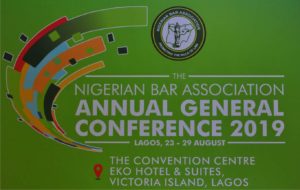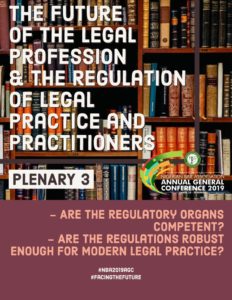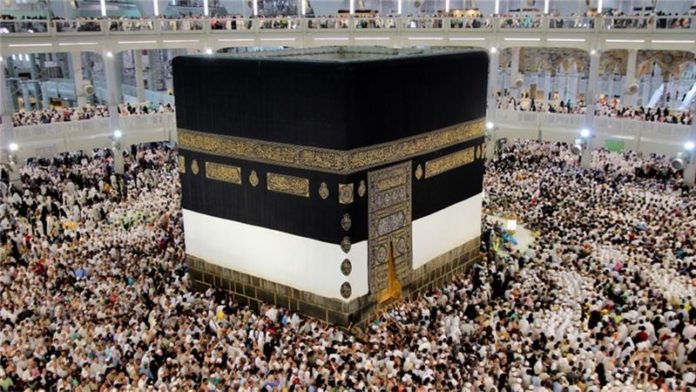


A Probe into the Justification of State-Sponsored Pilgrimages in Nigeria – By Collins Ogonnaya Arikor
The dilemma of the American constitution-makers was not compounded, as it is in Nigeria and suchlike religious countries, by diversity of religious groups comprised within the country. The thirteen founding American colonies were populated largely by people of the same national origin and cultural and historical background, and even, it might safely be argued, religious beliefs. The Nigerian society, on the other hand, is peculiarly plural, not only as a result of the large number of different socio-cultural groups within the country, and the vast number of different languages, religions and traditional occupations, but more importantly because the differences in attitude, outlook, character and way of life of the different comprising groups are so pronounced and fundamental as to make them different peoples in reality. To this very day, the Nigerian society is yet to fully find a way of realising its potentials without incurring the wrath of religious adherents who feel, at the slightest instance, that their religions are being abused or disrespected.

Nigeria reportedly stands as Africa’s most populous nation, with over one hundred and eighty-two (182) million people and nearly five hundred (500) ethnic groups speaking well over five hundred (500) distinct languages. Arguably no other issue in Nigeria has generated quite an intense and heated volume of controversy in Nigeria’s political and constitutional landscape as the question of religious co-existence, or, the status of religions in the country. For instance, the military junta of General Ibrahim Badamosi Babangida unceremoniously enrolled Nigeria into the Organisation of the Islamic Conference in 1989, a move which aggravated religious tensions in the country, particularly among the Christian population.
The country, from all indications is split along the lines of religious, tribal, or social sentiments and loyalty. The situation is that a federal system was created by the mechanical drawing of borders, which has made strange bedfellows of ethnic groupings, with different histories, languages, traditions or religious beliefs. Muslims and Christians make up majority of the population, while about ten (10) per cent practice indigenous traditional religions such as those native to the Igbo and Yoruba peoples. For a long time, Nigeria has grappled with how to govern a diverse country as it, in which the struggle for political power and domination is overwhelmingly causing a rift in the polity. And sadly such political power is contested vigorously along ethnic, religious or social backgrounds. Little wonder a former President made the declaration that Nigeria is a religious country! Yet there is a Constitution which provides that Nigeria is a secular state. This then leads one to inquire if state sponsorship of pilgrimages has acquired some form of constitutional legitimacy or statutory backing.
Different tiers of government in Nigeria have habitually sponsored their citizenry to undertake purely religious ritualistic pilgrimages to either of Mecca in Saudi Arabia or Jerusalem in Israel, since gaining independence in 1960. In order to facilitate annual pilgrimages to Mecca or Jerusalem, the Federal and State governments established the Pilgrims Welfare Boards across the states of the federation. Such Boards clearly profess and support the two main orthodox religions in the country: Christianity and Islam. This is coming against the background that the grundnorm, the Constitution, has at various times proclaimed that Nigeria is a secular State. That is, a religion-less State.
In 2013 alone, the Nigerian government helped sponsor about 30,000 Christians to make pilgrimages to the Christians’ Holy sites while it also actively supported about 90,000 Muslims to make the Hajj, a pilgrimage that all Muslims are encouraged to make at least once in their lifes’ time. Though the governments try to deny this by claiming they only assists the pilgrims through advantageous pilgrimage packages, there is sufficient evidence to show that governments actually pay for some of the pilgrims, most especially government officials.
A pilgrimage is a journey in search of moral or spiritual significance. Typically, it is a journey to a shrine or other historic location of importance to a person’s beliefs and faith. It cannot be faulted that pilgrimages are the dictates of a particular religion. Many religions attach spiritual importance to particular places: the place of birth or death of the founders or saints, or to the place of their calling or spiritual awakening, or of their connection with the divine, to locations where miracles were performed or witnessed, or locations where a deity is said to live or housed, or any site whatsoever that is seen to have spiritual powers. For Christians, a pilgrimage to Jerusalem is basically seen as journeying to the very source of Christianity. In Islam, the Hajj is one of the five pillars of Islam. The five pillars are the five basic duties to be followed by a Muslim in order to achieve full Muslim status. Hence, one can clearly see that the essence of such pilgrimages are mainly based on their aesthetics and artistic values to the individual concerned rather than of any beneficial value to the community as a whole.
The supporters of religious pilgrimages point out that religion is no doubt a way for man to fulfill his spiritual yearnings, a filling to his spiritual lacuna, an answer to his eternal quest and a display of his invisible yet strong faith and belief. And since pilgrimages serve to strengthen such faith and belief, it is only necessary that such pilgrimages be encouraged and continued. They cite the Constitutional provision that it is the duty of government to provide for the welfare of its people to drive home their point. According to a John Opara, Executive Secretary of the governmental Nigerian Christian Pilgrim Commission (NCPC), the government sponsors such pilgrims on the premise that the citizens sponsored experience spiritual re-births and return as better Christians and better citizens so as to extensively better Nigeria.
Just as religious pilgrimages purportedly serve a huge amount of interest to the Nigerian state, so does the disadvantages multiply in number. First, the opponents of pilgrimages readily point out that it is unconstitutional, rather it has a religious basis. They also point out to the yawning chasm between the rich and the poor in the country as one thing which is fostered by such pilgrimages since the monies used in sponsoring such pilgrimages could readily have served the purpose of reducing poverty in the country. Again, those against pilgrimages argue that apart from taking the somewhat absurd pride in bearing the title of ‘Jerusalem Pilgrimage’ (JP, for short) for the Christians or Alhaji for the Muslims, the state sponsored journey adds no practical or imaginary value to the Nigerian economy. They further submit that there is nothing to show that the pilgrimages have any impact on the wellbeing of society as all the corrupt politicians who embark on pilgrimages do is to compile a list of unworthy disciples to go on frivolous trips with them in the name of pilgrimage. They then ask the burning question: Why then should the state be willing to give validity to such idiosyncratic beliefs.
This author is not contesting that religious sentiments be jettisoned at all, but that they should not largely influence political aspirations. A sad practice which continues till this very day in Nigeria is that votes during elections are cast on basis of a candidate’s religious background. Religion, sadly, remains a core, largely divisive part of the politics of regions and ethnicity in Nigeria. Raw appeal to the religious persuasion of electorates and candidates during elections are commonplace in Nigeria. But as can be clearly seen, what causes such rifts in Nigeria is not religion in itself, but religious extremism. Nigeria has recorded about 1,350 religious crises since independence. Nigeria today is beset with the plague of virulent religious intolerance, which in turn leads to religious crises after crises. During the 1980s religious riots occurred in and around the five cities of Kano in 1980, Kaduna in 1982, Bulum-Ketu in 1982, Jimeta in 1984 and Gombe in 1985. Since the current Boko Haram insurgency started in 2009, the religious sect has killed a reported 20,000 innocent Nigerians and displaced about 2.3 million from their homes.
The attempt to incorporate moral values and norms based on religious persuasion into the law creates problems, no doubt. With due respect to the authorities concerned, the state sponsorship of pilgrimages to Israel or Saudi Arabia is — apart from draining Nigeria from very vital financial resources which could otherwise have aided in developing the country — unconstitutional, illegal and of no validity whatsoever. Rather than even enhance religious tolerance in the slightest, the sponsorship of such pilgrimages only enhance religious intolerance on the contrary as evidenced by the various calls from all quarters within the polity that the composition of their adherents to the pilgrimages is being short-changed in favour of the other side.
While it is only fitting that the state makes an effort to try and accommodate the religious beliefs of its members, for law can only serve as a means of realising peoples ordinate and legitimate aspirations, there is always a point at which the state can continue to give support and validity to a particular religion over the others. And the society which chooses to be expressly involved in promoting one religion over the other, a clear act of governmental discrimination, only speaks of impending doom for such society. There is no gainsaying the inherent danger of government being involved in discriminating against its own citizens. As it is today in Nigeria, what if tomorrow, the Olumba Olumba adherent or the Amadioha or even the Ogun adherent decides to go on his own pilgrimage to any part of the world apart from Israel and the state is not willing to grant his wishes. Is that not a clear case of discrimination? What if the Hare Krishna believer insists on going to New Delhi, India for a World Conference of Krishna followers and the state is insisting they do not grant such requests if not to Jerusalem? For it can never be denied, the above examples are also to serve the same purpose as pilgrimages to Jerusalem, if not more. Sponsoring pilgrimages, in my humble view, only amounts to governmental irresponsibility and social apathy, quite frankly.
Collins Ogonnaya Arikor, Esq., a lawyer, writer and human rights activist. Reached Collins via collins.arikor@gmail.com


Newswire, we present the world of law and the issues that engage them. This edition is yet again, ‘Mind-blowing’. Go get your copy(ies) Now!

Do you need to be heard? Or your articles published? Send your views, messages, articles or press release to: newswiremagazine@yahoo.co.uk >>> We can cover your (LAW) events at the first Call: 08039218044, 08024004726
-Advertisement-
Grab our latest Magazine, "Chief Wole Olanipekun, CFR, SAN, A man of wide horizons and deep intentions". Get your order fast and stress free.
For more details about Newswire Law&Events Magazine, kindly reach out to us on 08039218044, 09070309355. Email: newswiremagazine@yahoo.co.uk. You will be glad you did
Download E-MagazineDo you want to be heard, your events covered, your articles published, or need to advertise your products and services on our Blog and Magazine, reach out to us at Newswire Law and Events, you will be glad you did. For more details about our services, please call: 08039218044, 09070309355. Email: newswiremagazine@yahoo.co.uk







